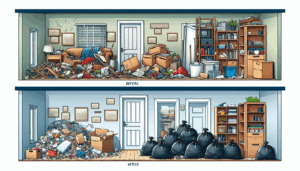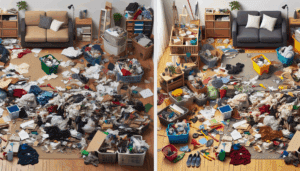Hoarding is a complex psychological disorder characterized by the excessive accumulation of items and the inability to discard them. People who hoard often have difficulty organizing their belongings and may experience extreme distress at the thought of getting rid of anything. Hoarding can lead to cluttered living spaces, strained relationships, and even health and safety hazards. It is estimated that hoarding affects between 2% and 6% of the population, making it a relatively common issue in society.
Key Takeaways
- Hoarding is a serious mental health disorder that can have negative impacts on your health and safety.
- Understanding the root causes of hoarding, such as trauma or anxiety, is crucial in addressing the behavior.
- Overcoming hoarding habits can lead to improved mental health, relationships, and overall quality of life.
- Identifying and addressing hoarding behaviors may require professional help, such as therapy or counseling.
- Cleanup strategies for hoarded homes and spaces should prioritize safety and involve a systematic approach to decluttering and organizing.
Understanding the Causes of Hoarding
Hoarding behaviors can be influenced by a variety of psychological and emotional factors. Many individuals who hoard have a strong attachment to their possessions, often associating them with feelings of comfort, security, or identity. Traumatic experiences, such as the loss of a loved one or a significant life event, can trigger hoarding behaviors as individuals seek to fill emotional voids or regain control over their lives. Additionally, anxiety disorders, such as obsessive-compulsive disorder (OCD), can contribute to hoarding tendencies.
The Dangers of Hoarding for Your Health and Safety
Hoarding can have serious health and safety implications for individuals living in cluttered environments. The accumulation of items can lead to poor indoor air quality, as dust, mold, and other allergens become trapped in the clutter. This can result in respiratory problems, allergies, and other health issues. Furthermore, hoarded homes are at a higher risk of fire hazards due to blocked exits and the presence of flammable materials. In addition to health risks, hoarding can also pose safety hazards such as tripping over objects or having items fall on individuals.
The Benefits of Overcoming Hoarding Habits
Overcoming hoarding habits can have numerous benefits for mental health and overall well-being. Cluttered living spaces can contribute to feelings of stress, anxiety, and overwhelm. By decluttering and organizing their homes, individuals can create a more peaceful and calming environment. This can lead to reduced stress levels, improved sleep, and increased productivity. Additionally, overcoming hoarding habits can improve relationships with family and friends, as individuals are able to invite others into their homes without shame or embarrassment.
How to Identify and Address Hoarding Behaviors
Identifying hoarding behaviors in oneself or others can be challenging, as individuals often feel ashamed or embarrassed about their cluttered living spaces. However, there are some common signs to look out for. These include difficulty discarding items, excessive acquisition of items, cluttered living spaces that prevent the use of rooms for their intended purpose, and distress or anxiety when faced with the prospect of getting rid of possessions. If you or someone you know is struggling with hoarding behaviors, it is important to seek professional help. Mental health professionals can provide support and guidance in addressing hoarding habits.
The Importance of Seeking Professional Help for Hoarding
Seeking professional help is crucial for individuals struggling with hoarding behaviors. Mental health professionals, such as therapists or counselors, can provide therapy and support groups specifically tailored to address hoarding tendencies. These professionals can help individuals understand the underlying causes of their hoarding behaviors and develop strategies for overcoming them. Additionally, they can provide ongoing support and accountability throughout the recovery process.
Cleanup Strategies for Hoarded Homes and Spaces
Cleaning up hoarded homes and spaces can be a daunting task, but it is an essential step in overcoming hoarding habits. It is important to approach the cleanup process with patience and compassion, as individuals may have strong emotional attachments to their possessions. Breaking the task into manageable steps can make it feel less overwhelming. Start by focusing on one room or area at a time, sorting items into categories such as keep, donate, or discard. Enlisting the help of friends or family members can provide support and make the process more manageable. It is also important to prioritize safety during cleanup, wearing protective gear and taking precautions to prevent accidents or injuries.
The Role of Chandler Junk Removal in Hoarding Cleanup
Chandler Junk Removal can play a crucial role in hoarding cleanup. Their professional services can assist with hauling and disposing of the excess items that have been accumulated. They have the expertise and equipment to safely remove large quantities of items, ensuring that the cleanup process is efficient and thorough. By enlisting the help of a professional junk removal service, individuals can focus on their recovery and the emotional aspects of overcoming hoarding habits, while leaving the physical cleanup to the experts.
Tips for Maintaining a Clutter-Free Home After Hoarding Cleanup
After completing the cleanup process, it is important to establish strategies for maintaining a clutter-free home. Creating a cleaning schedule can help individuals stay on top of household chores and prevent clutter from accumulating again. Breaking tasks into smaller, more manageable steps can make them feel less overwhelming. Practicing mindfulness can also be helpful in maintaining a clutter-free home. By being present in the moment and intentionally choosing what items to bring into their living spaces, individuals can prevent clutter from building up again. Ongoing support and accountability are also important in maintaining a clutter-free home. This can come from friends, family members, or support groups who understand the challenges of overcoming hoarding habits.
The Road to Recovery from Hoarding Habits
Overcoming hoarding habits is a challenging but achievable goal. By understanding the causes of hoarding behaviors and seeking professional help, individuals can begin their journey towards recovery. Cleaning up hoarded homes and spaces is an essential step in this process, and professional services such as Chandler Junk Removal can provide valuable assistance. By maintaining a clutter-free home and practicing ongoing support and accountability, individuals can create a healthier and happier living environment for themselves. Recovery from hoarding habits is possible, and with the right support and resources, individuals can look forward to a clutter-free future.
If you’re looking for effective cleanup strategies to overcome hoarding habits, you may also find this article on the top 5 reasons for using dumpster pick-up services helpful. Dumpster pick-up services can be a valuable resource when it comes to decluttering and disposing of excess items. They provide a convenient and efficient solution for removing large quantities of junk and can greatly assist in the process of tackling hoarding tendencies. Check out the article here to learn more about how dumpster pick-up services can support your journey towards a clutter-free life. Additionally, you can explore more insightful articles on decluttering and junk removal on their blog here.




